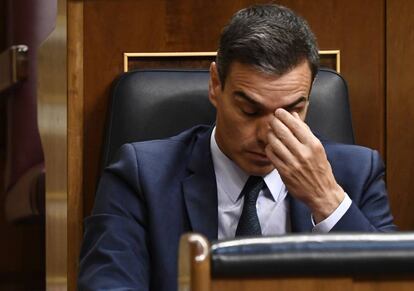Spain’s voters upset at stalemate but divided over a new election, poll shows
The majority of Unidas Podemos and Socialist voters do not want to go back to the ballot boxes, but right-wing supporters defend a new vote

Pedro Sánchez’s failed attempt to get himself confirmed as Spain’s prime minister has led to feelings of disappointment, sadness and anger among leftist voters, and to relief and satisfaction among right-wing supporters, according to an opinion survey commissioned by EL PAÍS.
The Socialist leader has sent a letter to card-carrying members with his plans to prevent a new election
A study by the pollster 40dB shows that 71.6% of citizens are either upset or at the very least concerned about the way their political representatives have conducted themselves throughout the prolonged post-election period, which ended in a failed investiture bid last week.
Only right-wing and far-right supporters feel that a return to the polls would be a good solution for Spain, which has already gone through three general elections in under four years. The last one, on April 28, was won by the Socialist Party (PSOE) but the party fell short of an overall majority and has been struggling to form a government.
Prolonged talks with the leftist Unidas Podemos (UP) failed to produce the required parliamentary numbers, as the latter pushed for a coalition government and dismissed as insufficient Sánchez’s offer of a few socially-oriented Cabinet positions.
Only five percent of PSOE and UP voters support a fresh election in November as a way out of the stalemate. But if an agreement is not reached by September 23, parliament will be automatically dissolved and new elections called, following Spanish legislation.
Letter to PSOE members
In the meantime, Sánchez is now trying to convince UP to accept a single-party PSOE government with a shared program but no Cabinet positions for the anti-austerity group.
Only five percent of PSOE and UP voters support a fresh election in November
The Socialist leader has sent a letter to grassroots party members with his plans to prevent a new election. Sánchez wants a “Portuguese-style” government, alluding to the leftist alliance supporting the government of the Socialist António Costa in Portugal.
For now, Podemos is rejecting this idea and insisting on a coalition government reflecting the party’s parliamentary presence: 42 lawmakers in the 350-seat house, making it the fourth force in Congress after the PSOE, the Popular Party (PP) and Ciudadanos (Citizens).
Instead of scheduling new talks with Podemos leader Pablo Iglesias, Sánchez has decided to meet “with different civil society groups such as feminist and environmental associations, social agents and third-sector groups so they can contribute to the creation of a common space in order to reach a progressive government,” says the letter.
Survey results
The survey, conducted between July 27 and 29, shows that 79.6% of Unidas Podemos voters support a coalition government with the PSOE. Only 32% of Socialist voters back that option, while 32.8% want Unidas Podemos to support a Socialist government without getting any Cabinet positions in return.
A further 29.4% of PSOE voters would prefer to do without Podemos altogether and secure an abstention from the Popular Party (PP) or Ciudadanos (Citizens). That is what the PSOE did in 2016 to allow Mariano Rajoy of the PP to form a government and avoid a new election.
But 64.1% of PP voters think that new polls are the best option, while 52.2% of Ciudadanos supporters feel the same way. This percentage soars to 79.9% among sympathizers of the far-right Vox.
English version by Susana Urra.
Tu suscripción se está usando en otro dispositivo
¿Quieres añadir otro usuario a tu suscripción?
Si continúas leyendo en este dispositivo, no se podrá leer en el otro.
FlechaTu suscripción se está usando en otro dispositivo y solo puedes acceder a EL PAÍS desde un dispositivo a la vez.
Si quieres compartir tu cuenta, cambia tu suscripción a la modalidad Premium, así podrás añadir otro usuario. Cada uno accederá con su propia cuenta de email, lo que os permitirá personalizar vuestra experiencia en EL PAÍS.
¿Tienes una suscripción de empresa? Accede aquí para contratar más cuentas.
En el caso de no saber quién está usando tu cuenta, te recomendamos cambiar tu contraseña aquí.
Si decides continuar compartiendo tu cuenta, este mensaje se mostrará en tu dispositivo y en el de la otra persona que está usando tu cuenta de forma indefinida, afectando a tu experiencia de lectura. Puedes consultar aquí los términos y condiciones de la suscripción digital.








































